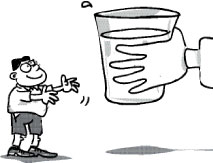Reply To:
Name - Reply Comment
 Despite widespread criticism on the failure to reduce the cost of living and prosecute former VIPs allegedly involved in large scale corruption, the National Unity Government is actively engaged in two creditable achievements -- making Sri Lanka a ‘Wasa Wisa Nethi’ country and providing fresh milk to schoolchildren.
Despite widespread criticism on the failure to reduce the cost of living and prosecute former VIPs allegedly involved in large scale corruption, the National Unity Government is actively engaged in two creditable achievements -- making Sri Lanka a ‘Wasa Wisa Nethi’ country and providing fresh milk to schoolchildren.
In May this year, President Maithripala Sirisena personally launched a national programme to grow all the nourishing food we need without the use of imported agro-chemicals, some of which are known to be toxic. The import and use of the weedicide glyphosate was banned though there was severe pressure from transnational chemical corporations and vested interests. Unfortunately, reports this week said that some transnational corporations were involved in the import and sale of glufosinate ammonium, a weedicide known to be 15 times as toxic as glyphosate. We urge the President and the government to take tough action against these anti-national groups which are trying to further pollute our Mother Earth. The government also needs to be strong in its policy of withdrawing the provision of subsidized fertilizer and instead provide cash to farmers to buy or make organic manure such as cow dung fertilizer. This week, the government also decided to provide money to tea, rubber and coconut cultivators in the hope that they would buy or make organic fertilizer, weedicides or pesticides instead of the toxic imported agro-chemicals.
On Wednesday a special event was held at the BMICH to present awards to students, who emerged as the most creative in essay, poster and poetry competitions promoting the provision of packets of fresh milk to schoolchildren. Education Minister Akila Viraj Kariyawasam, speaking at this event in the presence of President Sirisena, said during the past few decades most Sri Lankans had got used to the bad habit of using imported powdered milk because it was the easy way. He said the government believed that the best place to break this bad habit was the school and that was why fresh milk was being given to schoolchildren first. Hopefully the children will then tell the parents about the value of fresh milk as against imported powdered milk.
According to the Education Ministry’s School Nutrition Programme Director Renuka Peiris, packets of fresh milk bought from the Milco company are now being given to about 100,000 children in some 350 schools. The response from most children is that they like this fresh milk though it contains only 2.5 % sugar because of the danger that more sugar might lead to diabetes in later years. Ms. Peiris said the Ministry hoped to get more funds and expand this fresh milk programme to about 5,000 schools in the coming months and years.
According to people-friendly nutritionists, fresh milk is perhaps 500 times more nutritious than powdered milk, which we import at a cost of hundreds of millions of dollars every year. Till the late 1970s most of Sri Lanka’s people drank mainly fresh milk but in the 1980s a transnational company, identified as a baby killer, used subtle methods to destroy a large part of Sri Lanka’s dairy milk industry. The nutritionists say that when fresh milk is heated at more than 500 degrees centigrade to make it into powder, most of the nutrition is obviously lost. The transnational companies then add artificial sweeteners, flavour enhancing substances and preservatives, some of which are more than slightly toxic. Then millions of packets of this powdered milk under various brand names are dumped for the bulls in Third World countries like Sri Lanka.
Cabinet approval for the Education Ministry’s fresh milk programme was given in May last year. One year and one month have gone by but the progress made appears to be slow. Though the Ministry says the reason is lack of funds, health activists say other vested interests may be involved in blocking it. We urge the government to live by its promises and to put the country first. If fresh milk is the best for Sri Lanka’s children and indeed for all our people then fresh milk we must have.